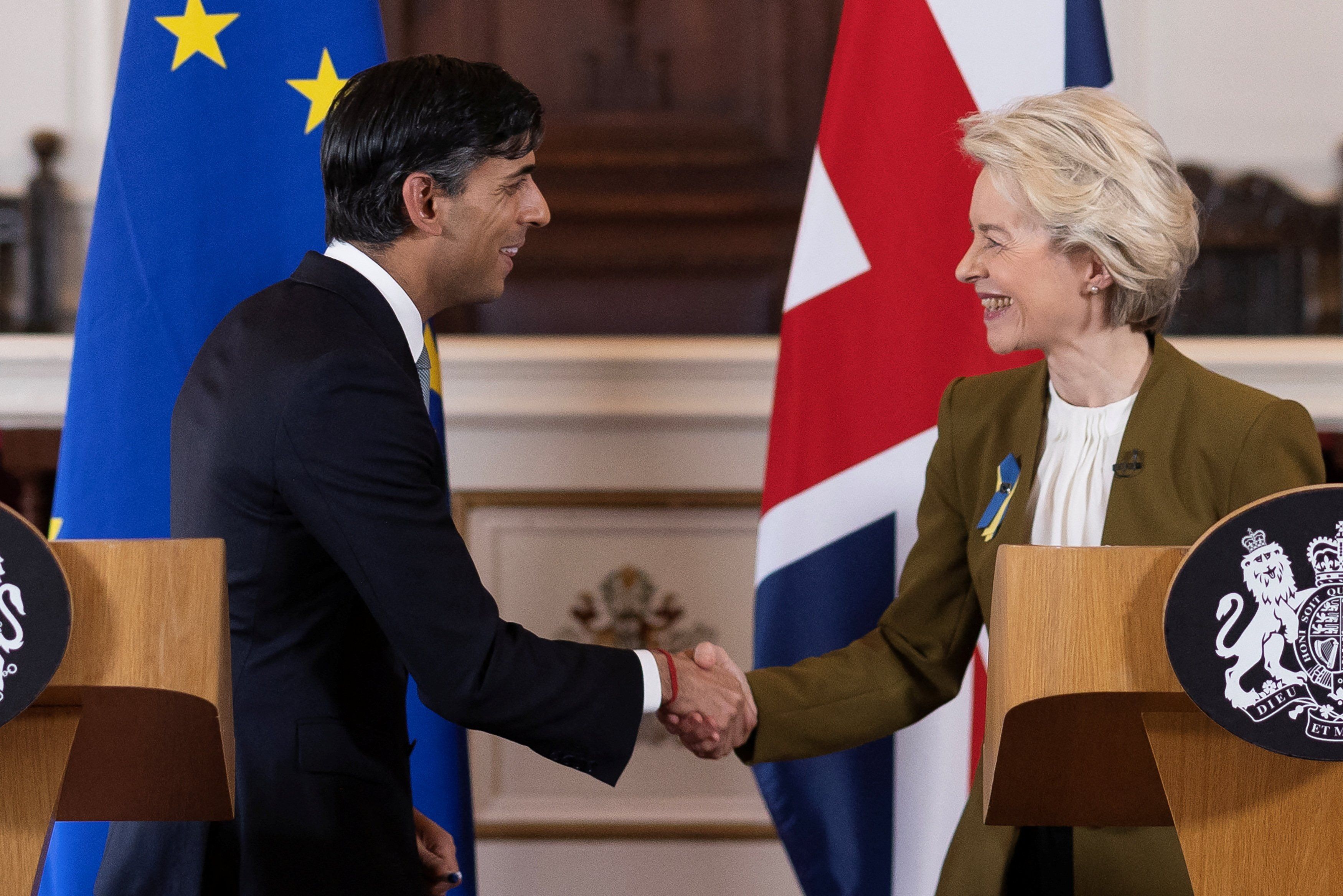What We’re Watching: Post-Brexit trade, West Bank chaos, Nigeria’s vote count, Teddies for Turkey
A historic post-Brexit breakthrough
UK Prime Minister Rishi Sunak and European Commission President Ursula von der Leyen unveiled a plan on Monday they say will finally resolve the complex problem of post-Brexit trade involving Northern Ireland. In the coming days, skeptics (and opponents) of the deal within Sunak’s Conservative Party and the Democratic Unionist Party in Northern Ireland will read the proposal closely to decide whether to approve it. The deal is intended to ease the flow of trade between Britain and Northern Ireland, some of which will flow across the UK’s border with the Republic of Ireland and into the EU. The deal creates two lanes for trade: a faster-flowing green lane for goods transiting only between Britain and Northern Ireland and a red lane with more rigorous customs checks for goods bound for the EU. The two biggest (of many) issues that will now be debated in Britain’s parliament: How to determine which lane each shipment of goods will travel through and what role the European Court of Justice will play in resolving trade disputes that involve Northern Ireland. Sunak appears to believe that his plan will pass parliament, but the scale of this important political victory for the embattled PM will depend on how much opposition from his own party and the DUP force him to rely on the opposition Labour Party for the votes needed to get it done. Sunak was in Belfast on Tuesday to sell the deal to the DUP.
West Bank on the brink
The West Bank experienced one of the largest single acts of settler violence on Sunday, when scores of Jewish settlers stormed the town of Hawara, near Nablus, torching vehicles and houses and leaving at least one Palestinian dead. The assailants said it was a “revenge” attack for the shooting of two Israeli brothers by a Palestinian gunman. (Another Israeli was killed in the West Bank on Monday.) This comes as the security situation in the occupied West Bank has been deteriorating for the better part of a year, with a spate of deadly Palestinian attacks in Israel leading to raids on Palestinian terror cells by the Israeli army. While the Israeli Defense Forces have been criticized for not acting fast enough to quell the violence in Hawara, recent events have revealed stark divisions within the far-right government of PM Benjamin Netanyahu. While some members of the government egged on the settlers – including the finance minister, who originally supported calls for burning down Hawara before walking it back – Netanyahu, for his part, gave a rare speech calling on Israelis not to take the law into their own hands and condemning "anarchy." Many analysts say this is a sign that the strong-minded leader fears he’s losing control of the security situation in the West Bank, a sensitive issue that will continue to deepen government fissures if it goes unchecked. Indeed, Bibi can’t afford cracks in his coalition after a new poll found that he would lose elections if they were held today.
Nigerian election count walk-out
Nigeria's two main opposition parties on Monday walked out of the site where results from Saturday's presidential election are being gradually announced after crying fraud over the slower-than-expected electronic transmission of results from polling stations. But according to Amaka Anku, Eurasia Group's top Africa analyst, there is a process for political parties to register complaints over election results related to the new system without having to abandon the premises. All political party agents, she explains, receive copies of the results sheets from each polling station and must sign off on the tallies at various stages of the counting process well before the national count begins. Those are the same sheets that are then uploaded onto a publicly available website. Nonetheless, the inability of the electoral commission to meet the high expectations it created — that those sheets would be immediately published — "casts a shadow over the whole process," says Anku. Final results are now expected on Tuesday, with ruling party candidate Bola Tinubu in the lead so far.
Teddy bears for quake survivor kids in Turkey
It's not all bad news out there. On Sunday, fans attending a Turkish league soccer game in Istanbul between local club Beşiktaş and Antalyaspor in Istanbul showered the field with teddy bears and other toys to be donated to child survivors of the recent earthquakes, the worst natural disaster in Turkey's history. The outpouring of support happened when the match was stopped for a moment of silence at 4 minutes and 17 seconds, marking the exact time — 4:17 am on Feb. 6 — when the first quake struck. But once the ceremony ended, it all got political, with thousands of members of the Çarşı, a hardcore Beşiktaş fan club, chanting to demand that President Recep Tayyip Erdoğan step down over his handling of the catastrophe and lax building standards enforced prior to it. There's no love lost between him and the famously left-wing, working-class Çarşı, rabidly loyal Beşiktaş fans with an anti-authoritarian streak whom Erdoğan knows will definitely not vote for him in the May 14 election.
